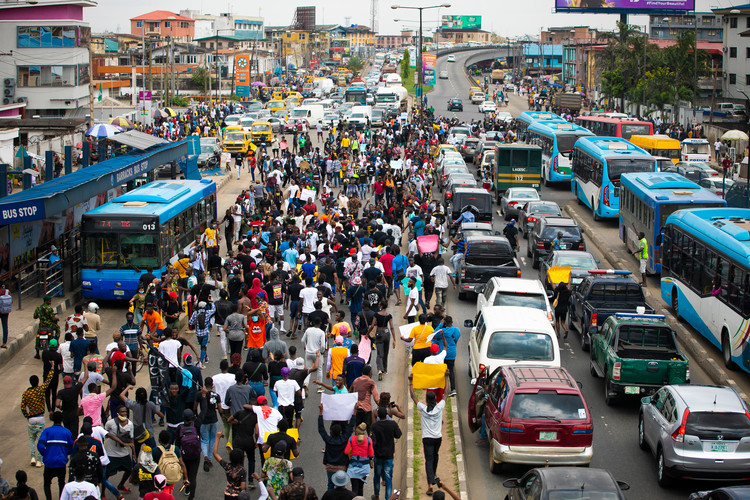Nigeria’s population demographics should be a concern to the country’s leaders. And if the policymakers fail today to plan for the country based on these demographics, that will be a potent invitation to inevitable disaster.
As in many areas of resource endowment, Nigeria’s population size should not be a problem. If anything, our challenge should be how to put to optimal use the number of people we have. That number continues to grow at a high rate, with the country’s population growth rate currently at about 3.2 per cent, adding to the pressure on the leadership. This is quite a high population growth rate, given the performance of the economy right now and the need to generate enough to feed everyone.
Nigeria’s population should be a source of hope for a strong economy. We have pollution estimated at 218.54 million in 2022, which has grown by some projections to 226.5 million people in early 2024. Given the high rate at which the population is growing, it will become one of the highest in the world.
This number is expected to rise to about 400 million by 2050 – that is 26 years from now, according to projections by the UNFPA. The UN agency places Nigeria as the third-most-populous country globally by that date. The two countries projected to have higher populations than Nigeria at that time are India and China.
- First anniversary: Nigerians demand better deal from Tinubu
- One year after, Nigerians grapple with unfulfilled promises
However, a country’s population is more than a mere number. It represents the nation’s power, and potential (intellectual, military, industrial, etc.). It also shows the nation’s challenges and hopes. It is a representation of the country’s future value, a kind of growth potential of a fund invested right now, with its value in the future being dependent on the interest rate at which that amount will compound over the tenor of the investment.
So, the true value of Nigeria’s current population and the numbers to be added from now till 2050 will depend on the policies, choices, and actions that successive governments will take.
Thus, whether the population will grow to become men and women of high productivity will depend on what the government does to equip them with the relevant skills. Whether they will become creative and innovative citizens will be a function of the priorities of the governments and the key decisions they take to bring the best out of their citizens. It will depend on the patterns of their expenditures as reflected in the national budgets. This will show how much the nation commits to education versus what it spends on other areas.
Similarly, whether the population will be made up of slum dwellers battling poverty of various shades and dimensions will also depend on the preferences of the governments. In other words, the population of a nation is not just in numbers; it consists of the people and the values they are equipped to create.
UNFPA says that about 95.1 million people, representing 42 per cent of the population, are at risk of being left behind due to the high rate of poverty.
This explains the importance that governments should attach to a country’s population. UNFPA says that women of childbearing age make up 24.8 per cent of the population, while young people (aged 10-24 years) make up 31.7 per cent, that is, over a third of the population. These two features of our population carry significant implications. First, the high percentage of women of childbearing age means that the age group of 10-24 years will be continuously replenished, hence the high population growth rate.
The implication is that Nigeria has a high dependency ratio, as many people in this group, just like the ones before them (0-9 years), will depend on someone for their upkeep, school fees, or other forms of dependency. Suppose Nigeria eventually adopts the suggestion that entry into tertiary institutions is from the age of 18 years. In that case, it implies that many in the 10-24-year-old group will leave universities and polytechnics within this bracket.
Combining this group with the next confirms that Nigeria has one of the youngest populations in the world. According to UNFPA, 63 per cent of the population is under 25 years, while 49.3 per cent is female. This means that nearly two-thirds of the population is aged under 25 years! This feature sets Nigeria and almost the rest of Africa apart.
Wealth or value creation is a function of both the quantum and quality of the resources deployed to the process. This is the group where Nigeria often records a high rate of unemployment, known as youth unemployment. The National Bureau of Statistics, using its new methodology for computing unemployment rates, put it at 8.6 per cent for the third quarter of last year. This used to be higher under the former system.
The challenge posed by these two groups to society is that we must make space for them. The first group needs space to be trained and equipped in formal and informal education. The next group comprises those who have been trained and need space now to be established in jobs. If society does not make jobs available for them that will be an open invitation to chaos.
The next few years will therefore be critical in providing a future for those around now and in doing so, making available a platform ready to receive future additions on the way.

 Join Daily Trust WhatsApp Community For Quick Access To News and Happenings Around You.
Join Daily Trust WhatsApp Community For Quick Access To News and Happenings Around You.


